Moldovan independence: 24 of political uncertainty
Moldova in the USSR
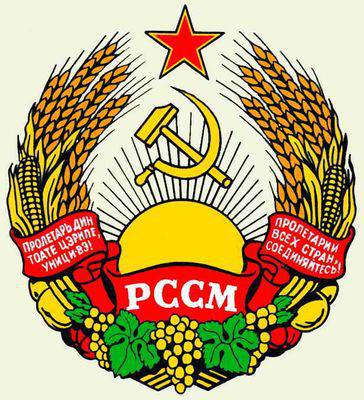 It should be noted here that in the composition of the Soviet Union the political position of Moldova was special. The Moldavian SSR was formed only in 1940 after the signing of the Molotov-Ribbentrop Pact, according to which Bessarabia, formerly part of Romania, ceded to the Soviet Union. Before 1940, there was a Moldavian autonomous Soviet socialist republic, which included the territory of Transnistria and parts of Ukraine, and was part of the Ukrainian SSR. After Bessarabia entered the Soviet Union, the MASSR received the status of a union republic. Initially, in the Moldavian SSR, the Soviet leadership pursued a fairly tough policy aimed at “sovietizing” the republic and fighting the “bourgeois past”. The most active policy of Sovietization of Moldova unfolded after victory in the Great Patriotic War — after all, almost immediately after the start of the Great Patriotic War, the territory of Moldova and part of the territory of Ukraine were occupied by Romanian troops and annexed to Romania. When in 1944, Moldavia was liberated by Soviet troops, the kulaks remained here, the clergy played an important role in public life - in general, the situation had significant differences from other republics of the Soviet Union. Moldavia’s “dekulakization” lasted until 1949, former landowners, businessmen, priests, officers of the Romanian army were evicted from Bessarabia. In total, 11 280 families were evicted - that is, more than 40 thousand people. Nevertheless, a significant part of the population of Moldova, especially in rural areas, tried to resist the policy of Sovietization. As it turned out - in vain: it was during the Soviet period that Bessarabia, the former one of the most backward regions of Romania, received incentives for economic and cultural development. In Moldova, thermal power plants and large industrial enterprises were built, education and health care developed. One of the most important sectors of the economy remained agriculture, including fruit and vegetable farming. The involvement of the Moldavian SSR in the union economy contributed to the further economic development of the republic and the improvement of its economic position.
It should be noted here that in the composition of the Soviet Union the political position of Moldova was special. The Moldavian SSR was formed only in 1940 after the signing of the Molotov-Ribbentrop Pact, according to which Bessarabia, formerly part of Romania, ceded to the Soviet Union. Before 1940, there was a Moldavian autonomous Soviet socialist republic, which included the territory of Transnistria and parts of Ukraine, and was part of the Ukrainian SSR. After Bessarabia entered the Soviet Union, the MASSR received the status of a union republic. Initially, in the Moldavian SSR, the Soviet leadership pursued a fairly tough policy aimed at “sovietizing” the republic and fighting the “bourgeois past”. The most active policy of Sovietization of Moldova unfolded after victory in the Great Patriotic War — after all, almost immediately after the start of the Great Patriotic War, the territory of Moldova and part of the territory of Ukraine were occupied by Romanian troops and annexed to Romania. When in 1944, Moldavia was liberated by Soviet troops, the kulaks remained here, the clergy played an important role in public life - in general, the situation had significant differences from other republics of the Soviet Union. Moldavia’s “dekulakization” lasted until 1949, former landowners, businessmen, priests, officers of the Romanian army were evicted from Bessarabia. In total, 11 280 families were evicted - that is, more than 40 thousand people. Nevertheless, a significant part of the population of Moldova, especially in rural areas, tried to resist the policy of Sovietization. As it turned out - in vain: it was during the Soviet period that Bessarabia, the former one of the most backward regions of Romania, received incentives for economic and cultural development. In Moldova, thermal power plants and large industrial enterprises were built, education and health care developed. One of the most important sectors of the economy remained agriculture, including fruit and vegetable farming. The involvement of the Moldavian SSR in the union economy contributed to the further economic development of the republic and the improvement of its economic position. Consumption in the Moldavian SSR on 25-30% exceeded the level of production. At the same time already in 1970-e - 1980-e. The Moldavian SSR was granted considerable autonomy in internal affairs and the central leadership of the USSR practically did not interfere in the policies of the republican leadership. As in other national republics, the priority of the interests of the “titular nation” was taken as the basis of domestic policy, i.e. Moldovans And this is despite the fact that by the 1989 Moldovans made up only 64,5% of the population of the republic. The rest was made by Russians, Ukrainians, Jews, Gypsies, and other nationalities. In cities, Russians, Ukrainians, Jews made up 54% of the population. However, the leadership of the republic clearly dominated persons of the titular nationality - Moldovans constituted 80% secretaries of the Communist Party Central Committee of Moldova, 70% secretaries of city and district party committees, 74% chairmen of people's councils of people's deputies. In fact, the political leadership of the republic was in the hands of the Moldovan elite, while representatives of other peoples of the MSSR were more active where real professional qualifications played a big role - in industry, science, and public health. However, serious ethnic conflicts until the end of the 1980-ies. in the republic did not arise. On the other hand, intellectual movements of a nationalistic character, including the so-called, gained momentum. “Romanian” is a group of writers, journalists, historians who tried to bring the Moldovan language as close as possible to the Romanian and considered Moldovans part of the Romanian people. The “Romanians” enjoyed a certain patronage of the local party leadership, which also took place in the majority of Moldovans.
Origin of romanism
After the formation of the Moldavian SSR and, especially, after the victory in the Great Patriotic War, in Moldavian cultural and political life, “Moldovanism” became established for some time, a cultural and political trend that recognizes Moldovans as a separate nation from the Romanians. history and culture. In 1924, after the formation of the Moldavian Autonomous Soviet Socialist Republic, and until the end of the 1930's. Moldovanism prevailed in the party’s policy of the republic’s leadership, but in 1938 the concept of “Romanianism” gradually spread, with the result that the Moldovan language was translated into Latin script, the thesis on the unity of Moldovan and Romanian culture was carried out. After the liberation of the Moldavian SSR from the Romanian invaders, for obvious reasons, with Romanianism as the official position of the party leadership, it was over. But in 1954, after the death of Stalin, in the Moldavian SSR, Romanian tendencies began to gain momentum again. Initially, they appeared in the philological environment in the form of doubts about the independence of the Moldovan language and culture. The spread of Romanian sentiment was promoted by the policy of Nicolae Ceausescu, the leader of neighboring Romania, who, despite his commitment to communist ideas, made a significant contribution to the development of renewed Romanian nationalism. Literature in Romanian from Socialist Romania was imported into the Moldavian SSR, and cultural ties between the republics grew stronger. Since Romania was a country of the socialist camp, the party leadership of the Moldavian SSR treated this condescendingly.
In the end, Romanianism became widespread among Moldavian intellectuals and young people, to some extent preparing the ground for the emergence and rapid spread of nationalism in the late 1980-s. Initially, Romanian propaganda boiled down to the idea of imparting the status of the state language to the Moldovan language and the translation of the Moldavian language into Latin script. September 1988 was celebrated with the famous "Letter 66", in which the writers expressed the ideas of Romanism. Meanwhile, Romanian propaganda struck not only on the positions of Russians, Ukrainians and other national minorities of the Moldavian SSR, but also on the Moldovan identity itself, since it claimed that Moldovans are “wrong” Romanians who should be returned to the true path of development. Part of the leadership of the Communist Party of the Moldavian SSR, which remained in the position of Moldovenism, opposed attempts to the growing Romanization of Moldavian culture, but the Romanians enlisted the support of very high party leaders in Moscow, including Mikhail Gorbachev himself. As a result, the chairman of the Council of Ministers of the MSSR, I.P. Kalin, Secretary of the Central Committee of the CPM N.F. Bondarchuk, a number of other high-ranking party and government officials. After that, a commission of experts controlled by the Romanians called for giving exclusively Moldovan language the status of the state language of the Moldavian SSR and supported the translation of the Moldavian language into Latin script. 16 February 1989 g. Writers' Union of Moldova published a draft law "On the functioning of languages in the territory of the Moldavian SSR." This bill was an apology for nationalism and Romanianism, since it provided for the introduction of administrative and criminal liability for using other languages other than Moldovan in official practice, and deprived parents of the choice of the language in which their children should learn.
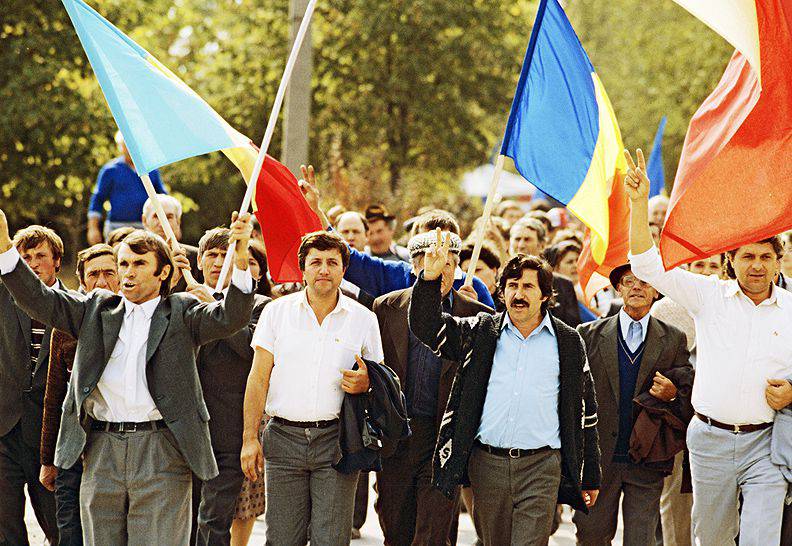
Rally of the Popular Front of Moldova. Photo6 I.Zenin: RIA-News
In parallel with the unwinding of the "language issue", the formation of the anti-Soviet nationalist movement began in the Moldavian SSR. And in the republic, in which until the end of 1980's. there was virtually no organized political nationalism, its formation was carried out with the help of instructors from the Baltic republics. Nationalists for conspiracy called themselves "democrats" and supporters of perestroika. In June, 1988 appeared in the Initiative Group of the Democratic Movement in Support of Perestroika. In May 1989 was created by the Popular Front of Moldova (PFM). He was educated by members of the Democratic Movement in support of perestroika and the Musical and Literary Club named after Alexei Mateyevich (Alexey Mateevich (1888-1917) - military priest by occupation) was also a poet and author of the poem "Our Language", later becoming the anthem of Moldova). The Popular Front of Moldova received wide support among the Moldovan intelligentsia and Moldovan youth in Chisinau, as well as the rural population of the regions inhabited by ethnic Romanians. In the summer of 1989, several demonstrations took place in Chisinau, where national extremist slogans “Moldova to Moldovans!” And “Suitcase-Station-Russia” were raised for the first time. The participants of the demonstrations demanded the provision of political sovereignty of the Moldavian SSR, recognition of the Moldovan language as the state language of the republic, and translation of the Moldavian language into Latin script. 31 August 1989 The MSSR Supreme Council decided to recognize the Moldovan language as the official language in the political, economic, social and cultural spheres. Also, the Latin script was returned to the Moldovan language. For the Russian language was left the status of language of international communication. The Supreme Council of the MSSR headed by Mircea Snegur, relying on the support of the Moldovan nationalist forces.
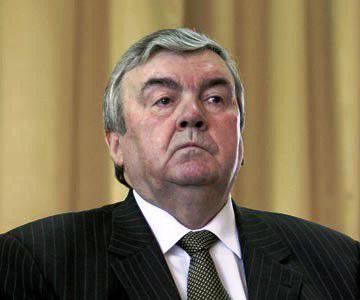 This person played one of the most important roles in the proclamation of Moldova as an independent state, in the cultivation of nationalism in the republic. From 1985, Mr. Snegur, an agronomist by profession and former chairman of a collective farm, served as secretary of the KP MSSR Central Committee. Yes, it was the party officials who once headed the collective and state farms throughout the USSR and became the real agents of the “parade of sovereignties” that had destroyed the great union state. Apparently, they followed the example of the chief chairman of a collective farm, whose activity as General Secretary of the CPSU Central Committee led to such dire consequences.
This person played one of the most important roles in the proclamation of Moldova as an independent state, in the cultivation of nationalism in the republic. From 1985, Mr. Snegur, an agronomist by profession and former chairman of a collective farm, served as secretary of the KP MSSR Central Committee. Yes, it was the party officials who once headed the collective and state farms throughout the USSR and became the real agents of the “parade of sovereignties” that had destroyed the great union state. Apparently, they followed the example of the chief chairman of a collective farm, whose activity as General Secretary of the CPSU Central Committee led to such dire consequences. The wave of nationalism. Romanism as an anti-Soviet ideology
Meanwhile, the nationalist movement in Moldova was becoming more widespread. 25 February 1990, at the first free elections to the Supreme Soviet of the Moldavian SSR, the Popular Front of Moldova won the majority of seats. The results of this change in the balance of power were not long in coming. Already 27 in April 1990 was introduced in the Moldavian SSR with new state symbols, and the blue-yellow-red tricolor became the official flag of the republic. In addition to the Popular Front, a whole range of nationalist organizations appeared in the country, among which are such movements with speaking names like “Our Romanian Language”, “Cultural League for the Unity of Romanians from Everywhere”, the National Christian Party of Moldova, and the Latin Genus. All of them professed the ideology of Romanianism and advocated the reunification of the Moldavian SSR with neighboring Romania, which suggested, of course, that the union state should be expelled. Practically on the 100%, the supporters of these organizations were Moldovans, they also defined themselves as ethnic Romanians, because the concept of Moldovan identity was rejected by Romanians. 5 June 1990. The Supreme Council of the MSSR decided to rename the Moldavian Soviet Socialist Republic (MSSR) into the Soviet Socialist Republic of Moldova (SSRM), which contradicted the USSR Constitution. 23 June 1990 The Supreme Council of the SSRM proclaimed the sovereignty of the republic within the Soviet Union. In June, 1990, the chairman of the Supreme Council Mircea Snegur, announced his withdrawal from the CPSU — the party that made him a politician. 3 September 1990 g. Mircea Snegur was appointed President of the SSRM.
The revitalization of nationalist movements led to the persecution of opponents of the Romanization of the Moldavian SSR and the establishment of the only official language of the republic of the Moldavian language. In turn, this led to the consolidation of opponents of Romanianism, represented, first of all, by representatives of the Russian and Russian-speaking population of the republic, as well as by Moldovans who did not want to abandon their Moldovan identity. Political organizations of a left-wing patriotic orientation appeared, uniting the opponents of the Romanization of Moldova. Another 8 July 1989 The international movement “Unite-Unity” was formed, which united the patriotic forces of the republic. Even earlier, in March 1989, the movement “Gagauz Khalki” was created, which included not only representatives of the Gagauz national minority, but also other peoples who lived in the territory of the historical region of Gagauzia, which was part of Moldova. November 12 1989 city The extraordinary congress of representatives of the Gagauz people proclaimed the creation of the Gagauz Autonomous Soviet Socialist Republic within the MSSR, but the MSSR Supreme Council overturned this decision as anti-constitutional. The Moldavian nationalists, who themselves acted as separatists in relation to the Soviet state and pressed for the need for national self-determination of the Moldovan nation, which they called the Romanian nation, behaved like real imperialists in relation to the national minorities. And not only in relation to the Russian people, but also in relation to indigenous ethnic groups, such as the Gagauz national minority. The supporters of self-determination of Moldova preferred not to speak about the right to self-determination of the Gagauz. 23 May 1989 city The city council of people's deputies of the city of Tiraspol appealed to the Presidium of the Supreme Soviet of the MSSR with a demand to adopt a law on two state languages on the territory of the republic - Moldovan and Russian. This was explained by the fact that in Transdniestria an absolute minority of the population spoke Moldovan language, while in other parts of the country Russian-speaking people also made up an impressive part of the population. From the movement “Unite - Unity” a proposal was made to hold a national referendum on the status of the Moldovan and Russian languages and writing for the Moldovan language. On August 16, a two-hour strike began to protest against the holding of a session of the Supreme Council, at which the draft law on the introduction of office work was to be discussed only in Moldovan. 30 of thousands of workers participated in the strike, but despite this, the radical nationalists did not retreat from the decision on the bill. On August 21, a national political strike began, and on August 29, when the session of the Supreme Council opened, 170 enterprises went on strike, including the largest factories in Chisinau. However, the nationalists managed to pass a law recognizing the Moldovan language as the only state language, introducing Latin script and recognizing the identity of the Moldovan and Romanian languages.
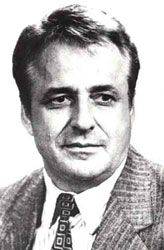 The government of the republic was headed by the leader of the Popular Front Mircea Druk - a former member of the CPSU, a graduate student at the Institute of Latin America at the Academy of Sciences of the USSR. At the same time, what is interesting, no more than 5% of the republic’s population supported the accession of Moldova to Romania. That is, the ruling elite really expressed the interests of only an absolute minority of Moldavian society — the nationalist intelligentsia, the young radicals, and a small part of the rural Romanians who fell under the influence of radical propaganda. Without the support of the leadership of the Communist Party, the Romanians would never have been able to come to power in the republic and carry out the corresponding political changes there.
The government of the republic was headed by the leader of the Popular Front Mircea Druk - a former member of the CPSU, a graduate student at the Institute of Latin America at the Academy of Sciences of the USSR. At the same time, what is interesting, no more than 5% of the republic’s population supported the accession of Moldova to Romania. That is, the ruling elite really expressed the interests of only an absolute minority of Moldavian society — the nationalist intelligentsia, the young radicals, and a small part of the rural Romanians who fell under the influence of radical propaganda. Without the support of the leadership of the Communist Party, the Romanians would never have been able to come to power in the republic and carry out the corresponding political changes there. Independence bloody soil
Gradually, the Romanians turned to outright terror against the Russian-speaking population. Blood was spilled. 14 May in the center of the Moldovan capital was beaten to death by 18-year-old Dmitry Matyushin, whose whole “fault” was that he spoke Russian. 20 May Romanians attacked a rally of Moldovan mothers, beating the Transnistrian deputies 20. Through violence, the Romanians intimidated up to 40% of the MPs, as the Supreme Council of the Republic came to be called, and forced them to stop coming to the sessions. After that, the absolute majority in the Parliament were Romanians. At the same time, the leadership of the Communist Party of the Republic practically did not intervene in the events taking place - even when the article of the Constitution was abolished, in which the leading role of the Communist Party in governing the republic was approved. On the initiative of M. Druk, who headed the Government of Moldova, the dismissal of workers of institutions that do not speak Moldovan began, and the admission of students from minority groups to higher educational institutions was reduced. The media became a tool of Romanian propaganda, the content of courses of historical and social disciplines in educational institutions was changed, in particular the course of the history of Moldova was replaced by the course of the history of Romanians. Naturally, such events could not but lead to a further increase in centrifugal tendencies in those regions of the country where Moldovans did not constitute a national majority - in Gagauzia and Transnistria. In Transnistria, the status of three languages - Russian, Ukrainian, and Moldovan - was officially secured, and in Gagauzia - the status of Gagauz, Russian, and Moldovan. August 19 was proclaimed the Republic of Gagauzia, September 2 - the Pridnestrovskaia Moldavskaia Respublika. Thus, the actions of the Romanians actually called into question the continued existence of Moldova as a single state, at least within the borders of the Moldavian SSR. But the actions of the Romanians crossed all the boundaries of what was permitted. Instead of going to a certain liberalization of national and language policies and achieve a compromise with representatives of internationalist organizations, the Romanians continued chauvinistic demarches. Thus, in Chisinau, monuments to Soviet soldiers were desecrated. In October, 1990, on the initiative of Druk, was organized a campaign in Gagauzia, after which mobilization began in Gagauzia. Together, the Gagauz, Transnistrian volunteers and military units of the Soviet Army managed to avoid a large-scale conflict. On November 2, Moldovan policemen shelled workers in Dubossary. Three were killed and 16 workers were injured. After these events, Gagauzia and Transnistria formed their own management structures.
- Moldovan police in Dubossary. Photo: forum.pridnestrovie.com
Meanwhile, the Congress of People's Deputies of the USSR appointed to 17 March 1991 an all-union referendum on the future of the Soviet Union. However, in Moldova, the Parliament decided not to hold this referendum - the Romanians were well aware that the overwhelming majority of the republic’s population would support the preservation of Moldova by the union republic, and this was not part of the separatist plans. It turns out that by political manipulation, the Romanians appropriated the right to speak on behalf of the entire Moldovan people and determine the future future of the republic. Although the activists of the “Unite-Unity” movement still tried to create polling stations for holding an all-Union referendum in Moldova, the latter were defeated by militants of the Popular Front. In Transnistria and Gagauzia, an absolute majority of residents voted for the preservation of the USSR, and a referendum was held by local authorities and working groups. In Moldova in general, 950 voted for the preservation of the USSR by thousands of people who have the right to vote - half of the total number of voters in the republic. The other part of the population did not take part in the referendum, first of all the residents of Chisinau, where the polling stations were defeated by the militants of the Popular Front. After the attempt of the coup d'état in the USSR failed by the State Emergency Committee, calls for full secession from the Soviet Union intensified in Moldova. In Chisinau, a number of rallies were held in support of secession from the USSR.
27 August 1991 Moldovan Parliament proclaimed the state sovereignty of the republic. In December of the same year, Mircea Snegur was elected the president of the country in the non-alternative elections. After the Soviet Union finally ceased to exist as a result of a trilateral agreement between the presidents of Russia, Ukraine and Belarus, the Russian Federation was the first in the world to officially recognize the state independence of the Republic of Moldova. Despite the fact that the political forces that came to power in Moldova openly spoke from anti-Russian and Russophobic positions, declared a desire to unite with Romania and strongly pursued and thrashed the Russian-speaking population, Yeltsin Russia continued to supply Moldova with energy and raw materials at prices substantially lower than than the world. Moldova, on the other hand, has retained the possibility of unhindered trade in the Russian market. At the same time, the Romanians, who acquired the maximum influence in the political life of the country, as well as expansionist circles in neighboring Romania, counted on the soon unification of the two republics into a single state. But the Moldovan population did not support the idea of Romanian accession to Romania, and the opponents of this idea were not only Russian-speaking residents of the republic, but also a large part of ethnic Moldovans, who retained Moldovan identity and did not want to dissolve in the Romanian nation, especially to be part of Romania’s secondary positions. As for Transnistria and Gagauzia, in these republics there was a massive arming of the people, their own armed forces were being formed, which in case of aggression from Moldova, could have resisted the nationalists and the Moldovan police units acting on their side. As subsequent events showed, this was an exceptionally correct decision.
- Barricade of Transnistrian militia against Moldovan fascists. Photo: voyna-1992.ru.
In an effort to consolidate the country's population in the fight against a fictional enemy, the Romanians turned to a policy of direct aggression against Transnistria. 25 September 1991 Moldovan police launched a raid on Dubasari, accompanied by mass beatings of citizens. 13 December 1991 Moldovan police attacked the post of Transnistrian guard in Dubossary. On the night of 1 in March, 1992 was killed in Dubossary, the head of the local police, I. Sipchenko, and on March 2, special forces of the Moldovan police attacked the Russian unit in the village of Cochiery. In Bender, Moldovan police from armored personnel carriers shot two minibuses of Transnistrian police and guards and a bus with workers. Such provocations were aimed at escalating the armed conflict and drawing Russia into it. The Romanians hoped that Russia's intercession for Transnistrians would allow them to count on military and economic assistance from NATO countries. However, the population of Moldova was completely alien to the conflict with Transnistrians, since the latter were never perceived as a hostile group, moreover, before the events in question and were not allocated to any particular part of the population of the republic. Therefore, the Moldovan army was faced with a shortage of recruits, there was no mass heroism in the ranks of the Moldovan police. It is noteworthy that not only Russians and Ukrainians, but also Moldovans, as well as volunteers from neighboring Gagauzia, fought in the ranks of Transnistrian militia. The presence of the 14 Army units of the Armed Forces of the Russian Federation in the region played a major role in organizing the resistance of the Moldavian aggression in Transnistria, which, of course, were many times superior to the Moldovan national army and police in combat capability and fighting spirit. The Moldovan leadership understood this perfectly well, but the Romanians did not want to retreat and continued their course towards the further development of the armed conflict. 130 of thousands of refugees fled from Transnistria. By July 1992, more than 1 thousand people, including 400 civilians, became victims of the conflict. In Moldova itself, criticism of the government and President Snegur by the left opposition sounded harsher, accusing the country's leadership in unleashing bloodshed. 21 July 1992 in Moscow M. Snegur and B.N. Yeltsin in the presence of the leader of Transnistria I.N. Smirnova signed a ceasefire agreement. Thus, a possible bloody war between Moldova and Transnistria was prevented. The Pridnestrovian Moldavian Republic has become a de facto independent state, the sovereignty of which, however, is not recognized by almost all countries of the world. Currently, the sovereignty of the PMR is recognized in part by the recognized Abkhazia and South Ossetia and the Nagorno-Karabakh Republic. For more than twenty years, Transnistria has been a headache for Moldova, as well as for Romania and NATO countries, which consider the unrecognized republic as an outpost of the influence of the Russian world in the region.
The relations of the young Moldova with Gagauzia developed somewhat differently. In 1990-1994 This territory, inhabited by the Orthodox Turkic-speaking people of the Gagauz, as well as by Bulgarians, Russians and Ukrainians, existed as a virtually independent state - the Republic of Gagauzia. She avoided mass bloodshed as in Transnistria, and at the end of 1994, the leaders of Gagauzia and Moldova managed to agree on the special status of the republic, after which the Autonomous Education of Gagauzia - Gagauz-Yeri appeared. In fact, it also retains full internal and even external independence, being able to implement policies that run counter to the common line of the Moldovan leadership. Thus, the Gagauz leadership after the events on Maidan openly supported Yanukovych, deployed the Berkut fighters for treatment on its territory, and then came out in support of the self-determination of the people of Novorossia, Donetsk and Lugansk people's republics.
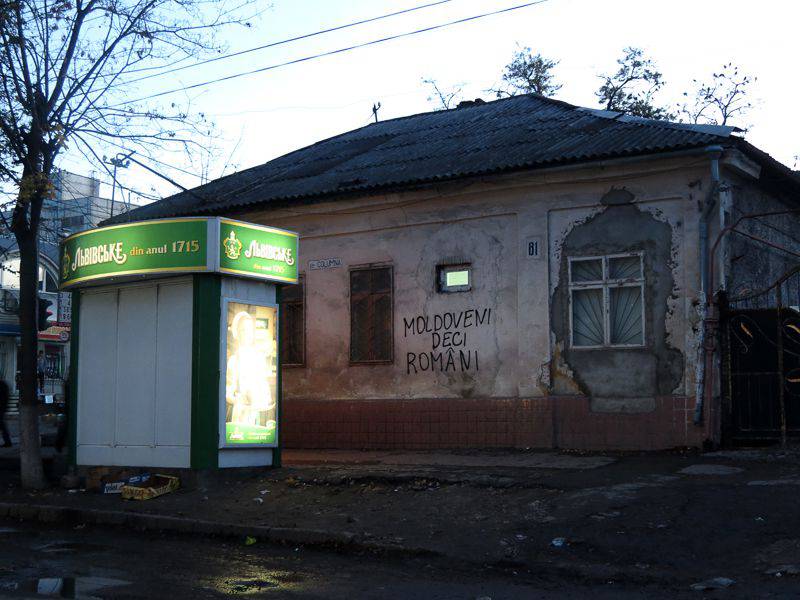
Photo: http://varandej.livejournal.com/508716.html
The economic consequences of sovereignty
Contrary to the expectations of supporters of independence, political sovereignty gave little good to Moldova and its people. First, the country was almost plunged into the abyss of a large-scale and bloody war. Secondly, the economy of Moldova after the proclamation of sovereignty sharply began to decline, despite the assistance that Russia continued to provide, supplying energy resources at preferential prices. The mass dismissals of specialists from the Russian-speaking population turned out to have negative consequences for Moldova - in fact, the same mistakes were made in the early 1990-s. many republics of the Caucasus and Central Asia. For this they continue to pay up to now with the shortage of qualified doctors, engineers, and technicians — after all, Russian-speaking specialists who emigrated from the country did not prepare a shift, their work traditions were lost. Secondly, emigration from Moldova has sharply increased - once a completely prosperous union republic. Only in the period before 1995, thousands of people left 107. Among them a significant part was made up of precisely qualified specialists - scientists, teachers, engineers, workers. The number of researchers decreased by three times. At the same time, the reorientation of the country towards economic cooperation with the West turned out to be that the western products were flooded with Western products, the competition with which local producers could not withstand either in terms of cost or quality. Many industrial enterprises were closed, which resulted in the marginalization of engineering, technical and labor personnel, their outflow from the country to Europe or Russia in search of employment. Moldovan citizens have become one of the largest groups of foreign labor migrants who are present on the Russian labor market and are concentrated in the construction and agriculture sectors as cheap labor.
According to sociologists, “men migrate to Russia mostly from the countryside, with secondary or secondary special education. Migration to Russia is mainly seasonal, migrants are in demand in such sectors of the economy as construction, transport, repair of roads, housing and communal services, and private and public services. Most migrants work in the construction sector (53%) or in unskilled jobs (24,9%) "(Poalelunzh OM in the international migration flow // Basic Challenges of Demographic Security: Similarities and Differences in Moldova and Belarus" - Chisinau: Shtiinets , 2010.) Moldovan women, by contrast, mostly migrate to European countries, due to the fact that homeworkers, nannies, waitresses are in greater demand in European countries. On the other hand, Moldova, along with Ukraine , is one of the main suppliers of sex workers in the countries of Eastern and Western Europe and the countries of the Middle East. Of course, it’s not from the good life that young and not very residents of this poorest republic in the region go abroad as selling priestesses of love And such conditions for the country's population were created by the very supporters of political sovereignty and unification with Romania, which 24 a year ago demanded the expulsion of Russian and Russian-speaking residents from the country. By the way, the leader of the Popular Front of Moldova, Mircea Druk, has long been living in Romania. A person who was an ardent supporter of Moldova’s independence, its secession from the Soviet Union, was the first prime minister of the country for a year, in 1992, that is, only a year after the proclamation of Moldova’s state sovereignty, received Romanian citizenship and left the country. He currently resides in Romania and continues to advocate the reunification of Romania and Moldova, considering the latter an artificial state to be a product of the Soviet political system.
Russophobia is cultivated from the outside
However, despite the obvious negative consequences of breaking the close economic and political ties with Russia, anti-Russian sentiments in Moldova continue to exist. They are diligently cultivated and spread by neighboring Romania, which finances nationalist social-political organizations of the Romanian nature, which come out from Russophobic positions, on Moldovan territory. In the Ministry of Foreign Affairs of Romania there is a Department for Relations with Romanians in other states, whose competence is in financing and organizational support of Romanian projects in Moldova. Only in April, 2015 for these needs were allocated hundreds of thousands of euros, aimed at helping the Romanian organizations and publications operating in Moldova. Official Bucharest almost does not hide the fact that it considers Moldova as a “second Romanian state”, and Moldovans - as a “Romanian”. At the same time, Romania forgets that the formation of the Moldavian nation took place when independent Romania as a single state did not exist yet, and two historical regions existed - Wallachia and Moldavia. The lands of Bessarabia became part of the Russian Empire as early as the 18th century, and many representatives of the Moldavian nobility went to work for the Russian emperor, having noted the long and faithful service of the Russian crown. During the Soviet period, Moldovans got the opportunity to develop their national culture, to study the national language, which would be impossible for Romania as a part of the “Romanization” policy of Moldovans. Moreover, representatives of the non-Romance national minorities living in the country, in the first place - the Gagauz, the Bulgarians, the Greeks and some Ukrainians, would also undergo Romanization.
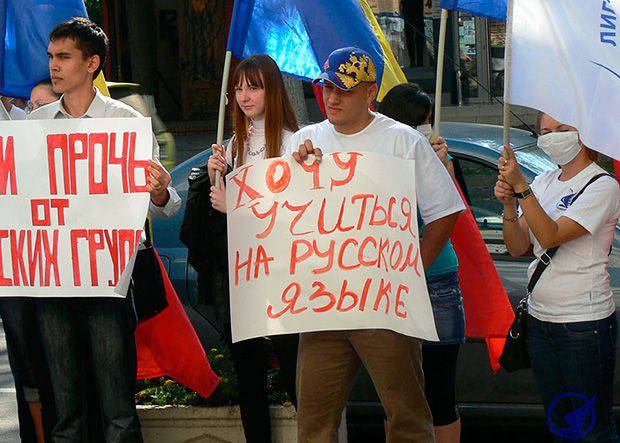
However, the current Moldovan President Nikolai Timofti actually denied the Moldovan people the presence of their own identity, saying at a meeting with Romanian President Traian Basescu: “We talked and agreed that Romania and the Republic of Moldova are two independent and sovereign states, but in which they live in mostly romanians. We are united by language, traditions, joys and misfortunes, through which the Romanians have passed over the past centuries. ” Meanwhile, according to the census, which was held in Moldova eleven years ago - in 2004, - 94% of the Roman-speaking inhabitants of the country described themselves as Moldovans, and not as Romanians. It is unlikely that in the course of a decade the ethnic self-perception of Moldovans could change radically. Accordingly, we are dealing with the continuation of the Romanian policy, which in the current political situation in Eastern Europe finds a new meaning. Moldova is interested in the West, first of all in the USA, as another tool for the implementation of anti-Russian policy. Romania, acting as a “senior comrade” of Moldova, is called upon to play a key role in setting Moldova on Russia, possibly in aggression against the Pridnestrovskaia Moldavskaia Respublika.
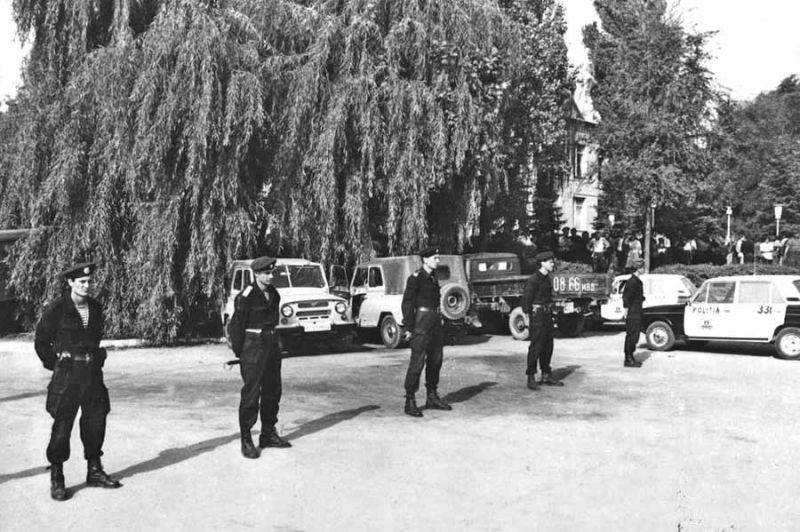
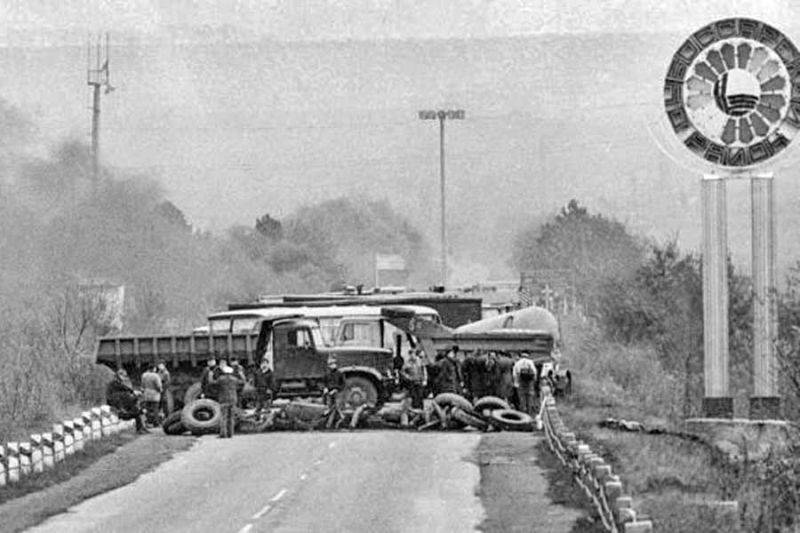
Information